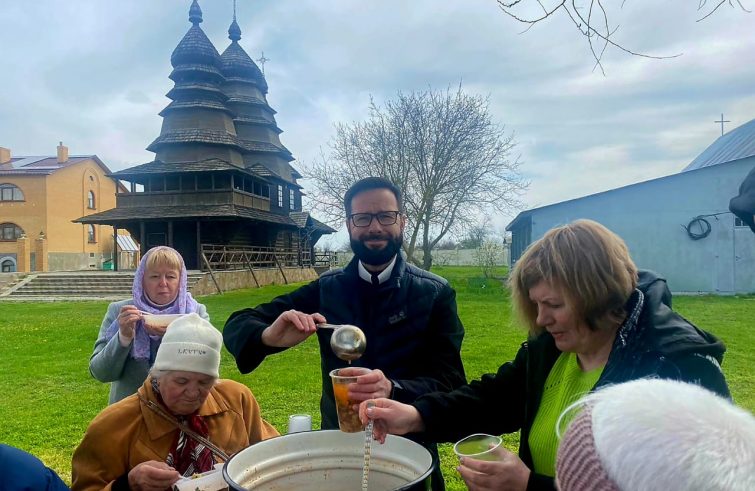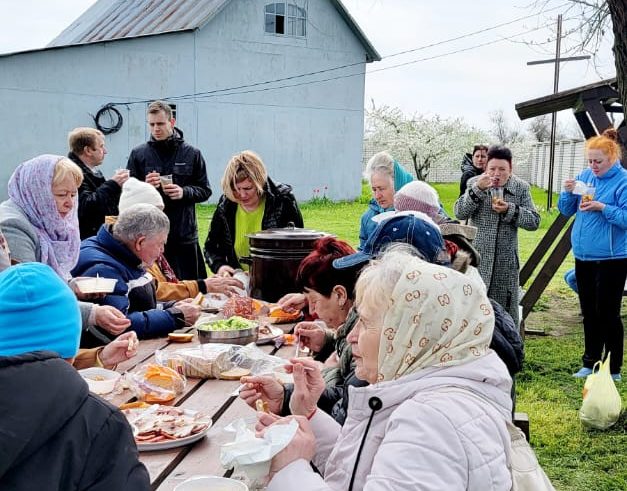
 Floodwaters in Kherson and in its surrounding villages are receding, the situation is slowly returning to normal, but fears rise about the risks coming from waterborne diseases and the presence of flood-dislodged landmines and munitions that could become lethal if incautiously handled. SIR contacted Fr Ignatius Moskalyuk, OSBM, rector of the Basilian Monastery of St Volodymyr the Great in Kherson, who reported on the situation in the city inundated by the floodwaters. He and one of his fellow monks had stayed in their monastery since the outbreak of the full-scale invasion, even when Kherson was under Russian occupation. In the early hours of June 6, Kakhovka Hydroelectric Power Plant – one of the many dams built along the Dnieper (also called Dnipro) River, the fourth-longest river in Europe, with the third largest basin that flows through Russia, Belarus and Ukraine – was blown up just a few kilometres away. The reservoir contained 18 cubic kilometres of water.
Floodwaters in Kherson and in its surrounding villages are receding, the situation is slowly returning to normal, but fears rise about the risks coming from waterborne diseases and the presence of flood-dislodged landmines and munitions that could become lethal if incautiously handled. SIR contacted Fr Ignatius Moskalyuk, OSBM, rector of the Basilian Monastery of St Volodymyr the Great in Kherson, who reported on the situation in the city inundated by the floodwaters. He and one of his fellow monks had stayed in their monastery since the outbreak of the full-scale invasion, even when Kherson was under Russian occupation. In the early hours of June 6, Kakhovka Hydroelectric Power Plant – one of the many dams built along the Dnieper (also called Dnipro) River, the fourth-longest river in Europe, with the third largest basin that flows through Russia, Belarus and Ukraine – was blown up just a few kilometres away. The reservoir contained 18 cubic kilometres of water.
The dam exploded causing severe flooding downstream. Fortunately, the monastery is located on a hill and therefore was not affected by the flooding. This enabled the priests to give a helping hand to all those affected already in the very first hours following the dam breach.
“The situation was initially alarming as we were unaware of the impact of the flooding in the area,” said Father Moskalyuk. “Now the situation is slowly stabilising, residents have been evacuated from their homes, those who remained in the city receive temporary accommodation and assistance from our monastery.” Before the Russian invasion, at least 100,000 people lived in these areas. Several dozen thousand at least remained after the war. The floodwater from the dam submerged an estimated 80 communities, according to Ukrainian authorities, and thousands of people were left without access to clean drinking water. One week after the disaster, Father Moskalyuk assures that “the water started to recede and even the animals are being rescued.” However, he remarked: “There are risks of waterborne diseases risks due to the contaminated floodwaters. In the city, elderly and disabled residents who struggle with mobility, are suffering the most.”
 The ongoing war aggravates the situation. The Dnipro River divides the city of Kherson between Russian and Ukrainian-controlled territory. The floods devastate an area already severely tested by the war. Devastation is added to devastation. The floodwater submerges houses that had been destroyed and reduced to rubble. Military operations are ongoing. “Once the water starts to recede,” the priest confirmed, “the flood-dislodged landmines and munitions will pose a severe threat, so local authorities are warning the population against picking up such objects.”
The ongoing war aggravates the situation. The Dnipro River divides the city of Kherson between Russian and Ukrainian-controlled territory. The floods devastate an area already severely tested by the war. Devastation is added to devastation. The floodwater submerges houses that had been destroyed and reduced to rubble. Military operations are ongoing. “Once the water starts to recede,” the priest confirmed, “the flood-dislodged landmines and munitions will pose a severe threat, so local authorities are warning the population against picking up such objects.”
 The list of things the small Basilian community needs is long: adult nappies, personal hygiene products, household cleaning products, laundry detergent, mattresses and sleeping bags. Also needed are water purifiers to make the water drinkable, the priest said. “The floods have also caused great damage to crops, flora and fauna. Many animals have died. But the most painful suffering is to see people dying as a result of the constant shelling from the Russian Federation.”
The list of things the small Basilian community needs is long: adult nappies, personal hygiene products, household cleaning products, laundry detergent, mattresses and sleeping bags. Also needed are water purifiers to make the water drinkable, the priest said. “The floods have also caused great damage to crops, flora and fauna. Many animals have died. But the most painful suffering is to see people dying as a result of the constant shelling from the Russian Federation.”
“As monks, we try to support the people with our presence, our prayers and the provision of much-needed humanitarian aid. What we really need is your prayers for us. Please help us.”









